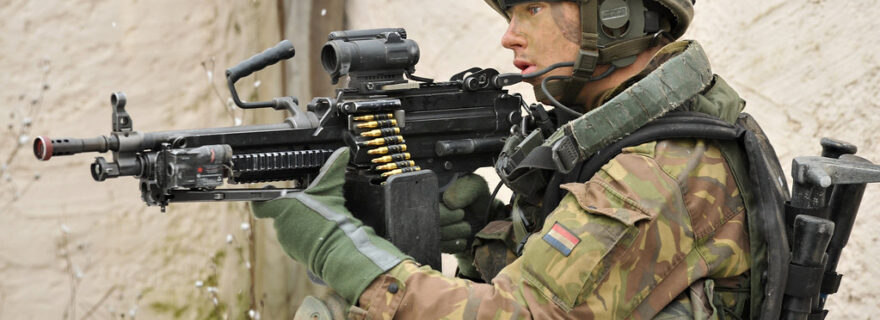Shifting Focus: Right-Wing Extremism in the Dutch Military
In 2019, it was reported that over the previous 5 years, 21 Dutch soldiers had been investigated by the Military Intelligence and Security Service (MIVD) due to suspicions of them being radicalized. Most of these cases concerned right-wing extremism (RWE), and not Jihadism or Salafism, which is where the focus within the military mostly lied during this time. While RWE is not a new phenomenon, the last couple of years have seen a shift in focus from Jihadism and Salafism to RWE within the Dutch military.
The General Intelligence and Security Service (AIVD) of the Netherlands has observed a revival of RWE ideology in the Netherlands since 2014. Also, in several other EU and NATO Member States, far-right violence has increased. This includes the United States, Canada and various Western European countries. According to the State of Hate report from 2021, created by European advocacy groups, there is a growing threat of far-right terrorism across the continent, as numbers show that right-wing terrorist attacks have increased over the years. This is accompanied, more broadly, by a rise in popularity of right-wing populist parties in Western Europe.
Yet, within the wider discourse on radicalism in the Netherlands, Jihadism has been singled out as a threat. The focus on Jihadism has had a trickle-down effect on the armed forces, specifically on their recruitment and screening processes, illustrated by, for example, motions to explicitly prohibit Salafism within the military. The National Coordinator for Security and Counterterrorism (NCTV) concluded that the disregarding of RWE due to the emphasis on Jihadism can be justified as Jihadism posed a more prominent threat within the Netherlands.
However, the AIVD report which indicates a revival of RWE has garnered the attention of the government, which stated in a 2018 response to this report that it would start putting efforts towards countering specifically the threat posed by RWE. This renewed attention has started to shift the focus on extremism within the armed forces as well. The cabinet has posed questions to the MIVD as recently as February 2021 about the threat of this ideology within the military. While in 2019 the MIVD reported to have found no indications of RWE networks within the armed forces, it had established that investigations into RWE have intensified and remain a priority for 2021. Finally, in the 2020 MIVD report RWE is explicitly mentioned as an area of concern, while there is no explicit mention of Jihadism of Salafism. This differentiates the 2020 report from those of previous years, which further indicates a shift in focus away from Jihadism and Salafism and towards RWE as a possible threat within the armed forces.
This shift in focus within the armed forces is relevant with regard to the mechanisms in place which aim to counter the threat of radicalization accurately and effectively. These safeguards consist, amongst others, of pre-service screening and reporting mechanisms. The MIVD found that RWE can undermine the internal safety within the armed forces, due to, for example, discrimination of personnel, which in turn puts the hierarchical structure and internal dynamics under pressure. There is no contention on whether radicalism and extremism form a threat, which is reflected in the emphasis that no form of radicalization is welcome within the military. However, an increased focus on a particularly threatening ideology might influence the suitability of the safeguards in place. Does this, for example, mean that RWE as a threat has been slipping through the cracks?
This question can potentially be answered through a comparative analysis of the responses of other NATO countries to extremism within their military due to the similar revival of RWE. In Germany, perhaps unsurprisingly for historical reasons, there is a clear focus on preventing and countering right-wing extremism within the armed forces. German authorities are, for example, attempting to put the German political party, Alternative for Germany, under surveillance due to extremism. Roughly 6% of this party’s members are career soldiers. Additionally, in 2017 an entire special forces company was disbanded due to right extremism.
In France, by contrast, the focus still lies mostly on countering and preventing Jihadism within the military. However, this does not necessarily mean that right-extremism does not exist in the French armed forces. The United Kingdom’s approach to terrorism seems to be the most similar to that of the Netherlands. In the UK, the focus on RWE has also increased over the past couple of years though the focus remains largely on Jihadism. One could question whether a similar shift in the military might occur across NATO countries, due to the increasing support of RWE ideologies.
While for the Netherlands it can be observed that there already is an increased focus on RWE within the military, it is not a new phenomenon as indicated by the several incidents before this shift in focus away from Jihadism and Salafism. The renewed focus might therefore be a result of the increasing threat of RWE within the Netherlands, instead of it being an indicator of a new threat within the armed forces. The question that remains is to which extent the current safeguards against radicalization already in place are suitable to detect and address also instances of RWE, or whether they will need to be adapted and possibly strengthened.
Acknowledgements
The research for this publication is partly funded by the Network for Research on Hateful Conduct and Right-Wing Extremism in the CAF initiative “Comparative analysis of NATO member states’ national approaches to combating extremism within their ranks.” All opinions are exclusively those of the authors.

